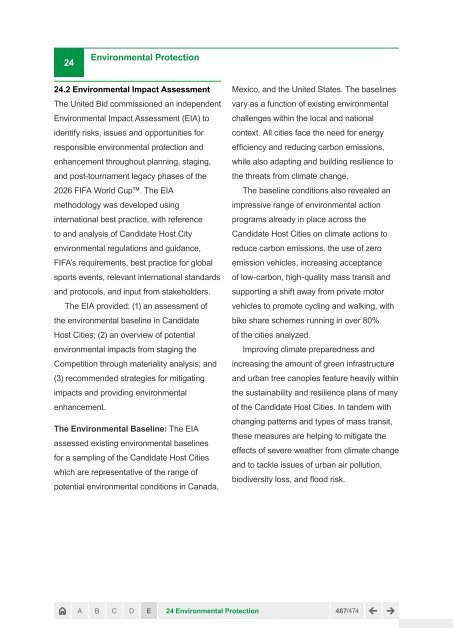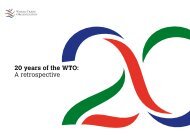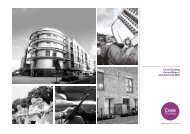- Page 1 and 2:
BID BOOK UNITY. Canada, Mexico, and
- Page 3 and 4:
BID BOOK OPPORTUNITY. Canada, Mexic
- Page 5 and 6:
INTRODUCTION A B C D E
- Page 7 and 8:
Introduction The FIFA World Cup is
- Page 9 and 10:
Introduction stadiums, college and
- Page 11 and 12:
Introduction more than just claimin
- Page 13 and 14:
UNITY CERTAINTY OPPORTUNITY We envi
- Page 15 and 16:
Chapter A Volume Hosting Vision and
- Page 17 and 18:
1 Integrated Hosting Vision and Str
- Page 19 and 20:
1 Integrated Hosting Vision and Str
- Page 21 and 22:
1 Integrated Hosting Vision and Str
- Page 23 and 24:
2LEGACY A B C D E 2 Legacy
- Page 25 and 26:
2 Legacy ■■ Together, we repres
- Page 27 and 28:
2 Legacy CONCACAF, to recruit new s
- Page 29 and 30:
2 Legacy We propose a vision for pu
- Page 31 and 32:
3 Political Support UNITY CERTAINTY
- Page 33 and 34:
3 Political Support in Host Countri
- Page 35 and 36:
3 Political Support in Host Countri
- Page 37 and 38:
3 Political Support in Host Countri
- Page 39 and 40:
3 Political Support in Host Countri
- Page 41 and 42:
3 Political Support in Host Countri
- Page 43 and 44:
3 Political Support in Host Countri
- Page 45 and 46:
3 Political Support in Host Countri
- Page 47 and 48:
3 Political Support in Host Countri
- Page 49 and 50:
Chapter B Volume Host Country Infor
- Page 51 and 52:
4 General Information UNITY CERTAIN
- Page 53 and 54:
4 General Information Canada: Since
- Page 55 and 56:
4 General Information The United St
- Page 57 and 58:
4 General Information 16Host Cities
- Page 59 and 60:
4 General Information North America
- Page 61 and 62:
4 General Information Over the past
- Page 63 and 64:
4 General Information Football in M
- Page 65 and 66:
CANDIDATE HOST CITIES A B C D E 4 G
- Page 67 and 68:
4 Candidate Host Cities Atlanta Atl
- Page 69 and 70:
4 Candidate Host Cities Baltimore A
- Page 71 and 72:
4 Candidate Host Cities Boston Bost
- Page 73 and 74:
4 Candidate Host Cities Cincinnati
- Page 75 and 76:
4 Candidate Host Cities Dallas Dall
- Page 77 and 78:
4 Candidate Host Cities Denver Denv
- Page 79 and 80:
4 Candidate Host Cities Edmonton Ed
- Page 81 and 82:
4 Candidate Host Cities Guadalajara
- Page 83 and 84:
4 Candidate Host Cities Houston Hou
- Page 85 and 86:
4 Candidate Host Cities Kansas City
- Page 87 and 88:
4 Candidate Host Cities Los Angeles
- Page 89 and 90:
4 Candidate Host Cities Mexico City
- Page 91 and 92:
4 Candidate Host Cities Miami The C
- Page 93 and 94:
4 Candidate Host Cities Monterrey M
- Page 95 and 96:
4 Candidate Host Cities Montréal T
- Page 97 and 98:
4 Candidate Host Cities Nashville N
- Page 99 and 100:
4 Candidate Host Cities New York/Ne
- Page 101 and 102:
4 Candidate Host Cities Orlando Orl
- Page 103 and 104:
4 Candidate Host Cities Philadelphi
- Page 105 and 106:
4 Candidate Host Cities San Francis
- Page 107 and 108:
4 Candidate Host Cities Seattle The
- Page 109 and 110:
4 Candidate Host Cities Toronto Tor
- Page 111 and 112:
4 Candidate Host Cities Washington,
- Page 113 and 114:
5POLITICAL INFORMATION A B C D E 5
- Page 115 and 116:
5 Political Information The Canadia
- Page 117 and 118:
5 Political Information The judicia
- Page 119 and 120:
5 Political Information There are a
- Page 121 and 122:
5 Political Information 5.4 Future
- Page 123 and 124:
5 Political Information 5.6 Coordin
- Page 125 and 126:
6ECONOMIC INFORMATION A B C D E 6 E
- Page 127 and 128:
6 Economic Information North Americ
- Page 129 and 130:
6 Economic Information Canada Canad
- Page 131 and 132:
6 Economic Information United State
- Page 133 and 134:
7 Media and Marketing Information U
- Page 135 and 136:
7 Media and Marketing Information 7
- Page 137 and 138:
7 Media and Marketing Information t
- Page 139 and 140:
Chapter C Volume Technical Matters
- Page 141 and 142:
Proposed Match Schedule Group Match
- Page 143 and 144:
8STADIUMS A B C D E 8 Stadiums
- Page 145 and 146:
8 United Approach To Stadiums All o
- Page 147 and 148:
ATLANTA 8 2026 FIFA World Cup Stadi
- Page 149 and 150:
NORTHSIDE DR. UP UP UP UP UP UP UP
- Page 151 and 152:
BALTIMORE 8 2026 FIFA World Cup Sta
- Page 153 and 154:
ELEV. 15'-0" ELEV. 31'-5" ELEV. 24'
- Page 155 and 156:
BOSTON 8 2026 FIFA World Cup Stadiu
- Page 157 and 158:
8 2026 FIFA World Cup Stadium Bosto
- Page 159 and 160:
8 2026 FIFA World Cup Stadium Cinci
- Page 161 and 162:
Copyright POPULOUS, LL GRAPHIC SCAL
- Page 163 and 164:
8 2026 FIFA World Cup Stadium Dalla
- Page 165 and 166:
8 2026 FIFA World Cup Stadium Dalla
- Page 167 and 168:
8 2026 FIFA World Cup Stadium Denve
- Page 169 and 170:
8 2026 FIFA World Cup Stadium Denve
- Page 171 and 172:
8 2026 FIFA World Cup Stadium Edmon
- Page 173 and 174:
8 2026 FIFA World Cup Stadium Edmon
- Page 175 and 176:
8 2026 FIFA World Cup Stadium Guada
- Page 177 and 178:
15 14 13 12 16 11 17 10 18 09 19 08
- Page 179 and 180:
8 2026 FIFA World Cup Stadium Houst
- Page 181 and 182:
8 2026 FIFA World Cup Stadium Houst
- Page 183 and 184:
8 2026 FIFA World Cup Stadium Kansa
- Page 185 and 186:
8 2026 FIFA World Cup Stadium Kansa
- Page 187 and 188:
8 2026 FIFA World Cup Stadium Los A
- Page 189 and 190:
8 2026 FIFA World Cup Stadium Los A
- Page 191 and 192:
8 2026 FIFA World Cup Stadium Mexic
- Page 193 and 194:
8 2026 FIFA World Cup Stadium Mexic
- Page 195 and 196:
8 2026 FIFA World Cup Stadium Miami
- Page 197 and 198:
TICKET BOOTH TICKET BOOTH ESCALATOR
- Page 199 and 200:
8 2026 FIFA World Cup Stadium Monte
- Page 201 and 202:
H1 H6 S1 S2 S4 V2 V3 V4 H6 M4 M5 M6
- Page 203 and 204:
8 2026 FIFA World Cup Stadium Montr
- Page 205 and 206:
8 2026 FIFA World Cup Stadium Montr
- Page 207 and 208:
8 2026 FIFA World Cup Stadium Nashv
- Page 209 and 210:
8 2026 FIFA World Cup Stadium Nashv
- Page 211 and 212:
8 2026 FIFA World Cup Stadium New Y
- Page 213 and 214:
8 2026 FIFA World Cup Stadium New Y
- Page 215 and 216:
8 2026 FIFA World Cup Stadium Orlan
- Page 217 and 218:
UP UP 149 148 147 146 145 143 151 1
- Page 219 and 220:
8 2026 FIFA World Cup Philadelphia
- Page 221 and 222:
H1 V2 H1 V2 V3 V3 S1 S2 S4 M4 M5 M6
- Page 223 and 224:
8 2026 FIFA World Cup Stadium San F
- Page 225 and 226:
8 2026 FIFA World Cup Stadium San F
- Page 227 and 228:
8 2026 FIFA World Cup Stadium Seatt
- Page 229 and 230:
H1 V2 H6 S1 S2 S4 V3 V4 V2 V3 V4 H1
- Page 231 and 232:
8 2026 FIFA World Cup Stadium Toron
- Page 233 and 234:
A1 B1 B2 B3 B4 B5 C1 C2 C3 F1 F2 F3
- Page 235 and 236:
8 2026 FIFA World Cup Stadium Washi
- Page 237 and 238:
8 2026 FIFA World Cup Stadium Washi
- Page 239 and 240:
9TEAM AND REFEREE FACILITIES A B C
- Page 241 and 242:
9 Team and Referee Facilities EDMON
- Page 243 and 244:
9 Venue-Specific Team Facilities -
- Page 245 and 246:
9 Venue-Specific Team Facilities -
- Page 247 and 248:
9 Venue-Specific Team Facilities -
- Page 249 and 250:
9 Venue-Specific Team Facilities -
- Page 251 and 252:
9 Venue-Specific Team Facilities -
- Page 253 and 254:
9 Venue-Specific Team Facilities -
- Page 255 and 256:
9 Venue-Specific Team Facilities -
- Page 257 and 258:
9 Venue-Specific Team Facilities -
- Page 259 and 260:
9 Venue-Specific Team Facilities -
- Page 261 and 262:
9 Venue-Specific Team Facilities -
- Page 263 and 264:
9 Venue-Specific Team Facilities -
- Page 265 and 266:
9 Venue-Specific Team Facilities -
- Page 267 and 268:
TEAM BASE CAMPS A B C D E 9 Team an
- Page 269 and 270:
9 Team Base Camp Facilities McDonog
- Page 271 and 272:
9 Team Base Camp Facilities Univers
- Page 273 and 274:
9 Team Base Camp Facilities Edmonto
- Page 275 and 276:
9 Team Base Camp Facilities Nationa
- Page 277 and 278:
9 Team Base Camp Facilities Estadio
- Page 279 and 280:
9 Team Base Camp Facilities Zions B
- Page 281 and 282:
REFEREES HQ A B C D E 9 Team and Re
- Page 283 and 284:
10 ACCOMMODATION AND FIFA HQ A B C
- Page 285 and 286:
10 Accommodation and FIFA HQ We hav
- Page 287 and 288:
10 Accommodation Atlanta The city o
- Page 289 and 290:
10 Accommodation Baltimore Baltimor
- Page 291 and 292:
10 Accommodation Boston One of the
- Page 293 and 294:
10 Accommodation Cincinnati Cincinn
- Page 295 and 296:
10 Accommodation Dallas Dallas has
- Page 297 and 298:
10 Accommodation Denver Nestled in
- Page 299 and 300:
10 Accommodation Edmonton Edmonton
- Page 301 and 302:
10 Accommodation Guadalajara Guadal
- Page 303 and 304:
10 Accommodation Houston Houston’
- Page 305 and 306:
10 Accommodation Kansas City From i
- Page 307 and 308:
10 Accommodation Los Angeles Los An
- Page 309 and 310:
10 Accommodation Mexico City Touris
- Page 311 and 312:
10 Accommodation Miami Miami is the
- Page 313 and 314:
10 Accommodation Monterrey Monterre
- Page 315 and 316:
10 Accommodation Montréal Montréa
- Page 317 and 318:
10 Accommodation Nashville Nashvill
- Page 319 and 320:
10 Accommodation New York/New Jerse
- Page 321 and 322:
10 Accommodation Orlando Orlando is
- Page 323 and 324:
10 Accommodation Philadelphia Phila
- Page 325 and 326:
10 Accommodation San Francisco Bay
- Page 327 and 328:
10 Accommodation Seattle Seattle is
- Page 329 and 330:
10 Accommodation Toronto Toronto we
- Page 331 and 332:
10 Accommodation Washington, DC Was
- Page 333 and 334:
11 AIRPORTS A B C D E 11 Airports
- Page 335 and 336:
11 United Approach to Airports cons
- Page 337 and 338:
11 Airports Baltimore, Maryland Bal
- Page 339 and 340:
11 Airports Cincinnati, Ohio Cincin
- Page 341 and 342:
11 Airports Denver, Colorado Denver
- Page 343 and 344:
11 Airports Guadalajara, Jalisco Mi
- Page 345 and 346:
11 Airports Kansas City, Missouri K
- Page 347 and 348:
11 Airports Mexico City, Mexico Mex
- Page 349 and 350:
11 Airports Monterrey, Nuevo León
- Page 351 and 352:
11 Airports Nashville, Tennessee Na
- Page 353 and 354:
11 Airports Orlando, Florida Orland
- Page 355 and 356:
11 Airports San Francisco Bay Area,
- Page 357 and 358:
11 Airports Toronto, Ontario Toront
- Page 359 and 360:
12 TRANSPORT INFRASTRUCTURE AND GEN
- Page 361 and 362:
12 United Approach to Transportatio
- Page 363 and 364:
12 United Approach to Transportatio
- Page 365 and 366:
12 United Approach to Transportatio
- Page 367 and 368:
12 United Approach to Transportatio
- Page 369 and 370:
12 Overall Transportation Infrastru
- Page 371 and 372:
12 Overall Transportation Infrastru
- Page 373 and 374:
12 Overall Transportation Infrastru
- Page 375 and 376:
12 Overall Transportation Infrastru
- Page 377 and 378:
12 Overall Transportation Infrastru
- Page 379 and 380:
12 Overall Transportation Infrastru
- Page 381 and 382:
12 Overall Transportation Infrastru
- Page 383 and 384:
12 Overall Transportation Infrastru
- Page 385 and 386:
12 Overall Transportation Infrastru
- Page 387 and 388:
12 Overall Transportation Infrastru
- Page 389 and 390:
12 Overall Transportation Infrastru
- Page 391 and 392:
12 Overall Transportation Infrastru
- Page 393 and 394:
12 Overall Transportation Infrastru
- Page 395 and 396:
12 Overall Transportation Infrastru
- Page 397 and 398:
12 Overall Transportation Infrastru
- Page 399 and 400:
12 Overall Transportation Infrastru
- Page 401 and 402:
12 Overall Transportation Infrastru
- Page 403 and 404:
12 Overall Transportation Infrastru
- Page 405 and 406:
12 Overall Transportation Infrastru
- Page 407 and 408:
12 Overall Transportation Infrastru
- Page 409 and 410:
12 Overall Transportation Infrastru
- Page 411 and 412:
12 Overall Transportation Infrastru
- Page 413 and 414:
12 Overall Transportation Infrastru
- Page 415 and 416:
13 IT&T and IBC UNITY CERTAINTY OPP
- Page 417 and 418:
13 United Approach to IT&T and IBC
- Page 419 and 420:
13 United Approach to IT&T and IBC
- Page 421 and 422:
13 United Approach to IT&T and IBC
- Page 423 and 424:
14 SAFETY AND SECURITY A B C D E 14
- Page 425 and 426:
14 Safety and Security A Security T
- Page 427 and 428:
14 Safety and Security Areas Outsid
- Page 429 and 430:
14 Safety and Security Stewards and
- Page 431 and 432:
15 COMMUNICATION, PR AND EVENT PROM
- Page 433 and 434:
15 Communication, PR and Event Prom
- Page 435 and 436:
15 Communication, PR and Event Prom
- Page 437 and 438:
15 Communication, PR and Event Prom
- Page 439 and 440:
16&17 FIFA Fan Fest/ Host City Fan
- Page 441 and 442:
17 FIFA Fan Fest/Host City Fan Serv
- Page 443 and 444:
17 FIFA Fan Fest/Host City Fan Serv
- Page 445 and 446:
17 FIFA Fan Fest/Host City Fan Serv
- Page 447 and 448:
17 FIFA Fan Fest/Host City Fan Serv
- Page 449 and 450:
17 FIFA Fan Fest/Host City Fan Serv
- Page 451 and 452:
17 FIFA Fan Fest/Host City Fan Serv
- Page 453 and 454:
17 FIFA Fan Fest/Host City Fan Serv
- Page 455 and 456:
17 FIFA Fan Fest/Host City Fan Serv
- Page 457 and 458:
17 FIFA Fan Fest/Host City Fan Serv
- Page 459 and 460:
17 FIFA Fan Fest/Host City Fan Serv
- Page 461 and 462:
17 FIFA Fan Fest/Host City Fan Serv
- Page 463 and 464:
17 FIFA Fan Fest/Host City Fan Serv
- Page 465 and 466: UNITY CERTAINTY OPPORTUNITY Every d
- Page 467 and 468: 18 Volunteers 18.2 Organization and
- Page 469 and 470: 18 Volunteers Volunteers will apply
- Page 471 and 472: 19 COMPETITION- RELATED EVENTS A B
- Page 473 and 474: 19 Competition-Related Events Preli
- Page 475 and 476: 19 Competition-Related Events FWC T
- Page 477 and 478: 20 HEALTH AND MEDICAL SYSTEMS A B C
- Page 479 and 480: 20 Health and Medical Systems The U
- Page 481 and 482: 20 Health and Medical Systems 20.4
- Page 483 and 484: 20 Health and Medical Systems Prepa
- Page 485 and 486: 21 Expenditure Budget and Ticket Re
- Page 487 and 488: 21 Expenditure Budget and Ticket Re
- Page 489 and 490: 21 Expenditure Budget and Ticket Re
- Page 491 and 492: 21 Expenditure Budget and Ticket Re
- Page 493 and 494: 22 SUSTAINABLE EVENT MANAGEMENT A B
- Page 495 and 496: 22 Sustainable Event Management dev
- Page 497 and 498: 22 Sustainable Event Management Rev
- Page 499 and 500: 22 Sustainable Event Management hum
- Page 501 and 502: 22 Sustainable Event Management Uni
- Page 503 and 504: 23 HUMAN RIGHTS AND LABOR STANDARDS
- Page 505 and 506: 23 Human Rights and Labor Standards
- Page 507 and 508: 23 Human Rights and Labor Standards
- Page 509 and 510: 23 Human Rights and Labor Standards
- Page 511 and 512: 23 Human Rights and Labor Standards
- Page 513 and 514: 23 Human Rights and Labor Standards
- Page 515: 24 Environmental Protection UNITY C
- Page 519 and 520: 24 Environmental Protection Carbon
- Page 521 and 522: 24 Environmental Protection Biodive
- Page 523 and 524: 24 Environmental Protection FIFA Wo
- Page 525 and 526: ACKNOWLEDGEMENTS A B C D E
- Page 527 and 528: BID BOOK UNITY. CERTAINTY. OPPORTUN
- Page 529 and 530: BID BOOK CERTAINTY. Canada, Mexico,
















